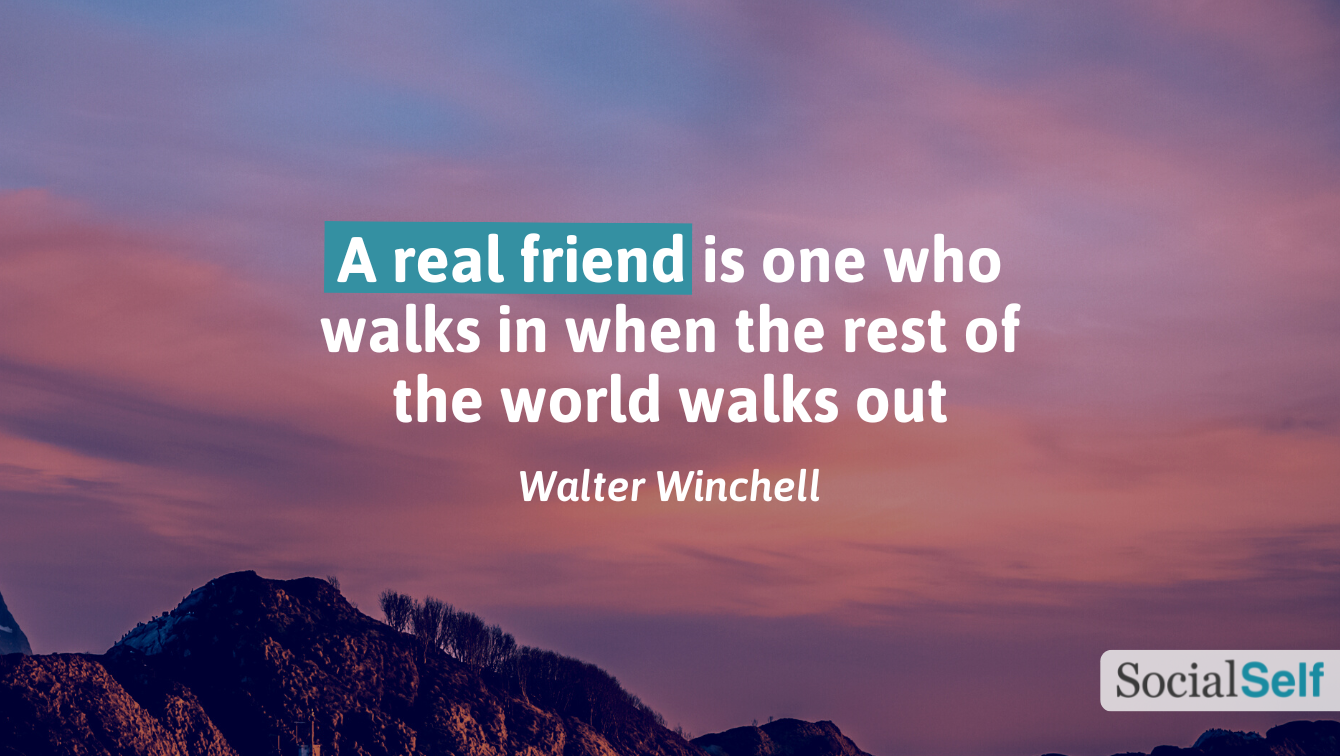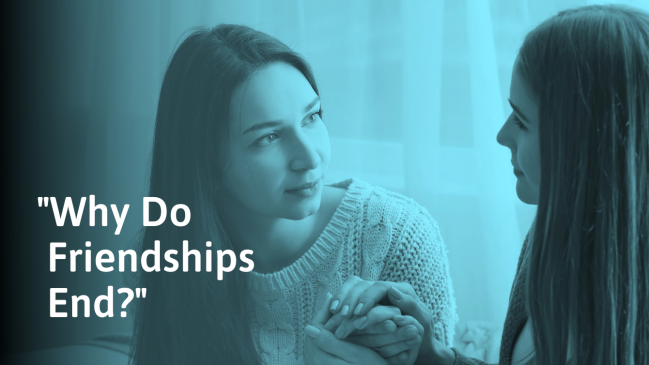A friendship breakup can be just as painful as a romantic breakup. Yet it’s often harder to understand the reasons why friendships end. And while romantic relationships usually have an official end where one person breaks up with the other, friendships often end in one person phasing the other out, resulting in a lot of “are we even friends anymore?” confusion.
A 2021 study by Apostolou and Keramari tried to find out why friendships end and came up with 55 different reasons, which they divided into four categories:[1]
- Selfishness (where the friendship may feel one-sided)
- Romantic involvement (for example, one side is romantically interested and the other isn’t)
- Lack of frequent interaction
- Perceptions of friends and family
The researchers found that female friendships were more likely to end due to perceived selfishness, while male friendships were more likely to end due to physical distance and not seeing each other regularly.
One thing to keep in mind is that this study relied on self-reporting, meaning that people were asked why they ended their friendships. Self-reporting offers us a lot of information, but often we aren’t completely aware of why we do things.
Consider, for example, someone who says they ended five friendships because the other person was selfish. While it’s possible that all five of her former friends were truly selfish, it’s also possible that this person is not as good at compromising as she thinks she is.
This article will help you gain some understanding of why some of your past friendships may have ended. If you want to end a friendship but don’t know how to approach this, read our guide on how to end a friendship.
Sections
Reasons why friendships end
While the endings of a friendship are as unique as the people who make up the friendship, we can generally divide the reasons friendships end into some common reasons or categories.
1. Lack of common interests
Sometimes people form friendships under certain conditions, such as studying or working together. When these conditions no longer apply, they may find that they don’t have much in common after some time.
Other times, friends may bond over shared interests, such as gaming or sports, but when one or both loses interest in these things, they grow apart and can’t figure out how to connect in new ways.
In both cases, the friendship tends to fizzle out as contact dwindles. Deep conversations become customary catching up and may even feel awkward. You may want to talk but not know what to say. As time goes by, it feels harder to reconnect after so much time has gone by.
2. Lack of time
Not seeing each other or talking regularly can really put a strain on a friendship. As we get further into adulthood, we may find ourselves feeling busier and busier. Work may take up more time, and many people end up caring for children, family members, or a romantic partner. Our physical health may require more time and effort to maintain, and as a result, it can be hard to find a time to meet up with friends who have conflicting schedules.
Sometimes one person moves away, and meeting in person becomes impossible. Phone calls and texts begin to dwindle, and you may realize you haven’t heard from them in months or even longer.
In some cases, people can lose touch for months or even years but still pick up where they left off when they see each other again. But other times, people may even feel uncomfortable asking someone to meet up after so much time has passed.
If lack of time is an issue, this article on how to deal with busy friends might be helpful.
3. Mismatched expectations
Friendship means different things to different people. One person may expect consistent contact and checking in, while their friend may have more of a “let’s talk when we feel like it” attitude. Some people are looking for deep connections from their friendships, while others may be looking for something more casual where they spend time together doing fun things.
If two people have different expectations of their friendship, one or both may end up disappointed and decide to end the friendship to find one that’s more suited to what they’re looking for.
4. Betrayal
Sometimes there are clear and even dramatic reasons why a friendship ends. Someone may feel betrayed when a friend dates their ex, for example, and feel too hurt to carry on the friendship.
Betrayal in a relationship can look like gossiping about each other, not being there when someone has a monumental life event and needs support (like the death of a family member), lying, and so on.
In some cases, you can rebuild trust in a friendship, but in many cases, people find it too difficult or choose not to do so. Some long-term friendships are worth doing the work to save, but in the case of a new friendship that’s fraught with trust issues early, it may be better to let go and stop reaching out to that friend.

5. The friendship feels one-sided
While a healthy friendship adds to your life, some friendships feel draining, frustrating, or leave you feeling bad about yourself. In these cases, it feels healthier to end toxic friendships. Being in a friendship where there is constant drama and our effort to keep the relationship is not repaid can seriously affect mental health and wellbeing. These one-sided friendship quotes might help you to spot really selfish friends more easily.
In a study by Apostolou and Keramari that looked into reasons why friendships end, these types of friendships would have been under “selfishness.” People in the study cited reasons such as “friend takes without giving” and “friend takes me for granted.”
If you’re looking for more specific advice regarding whether you should end a friendship, check out our article 22 signs it’s time to stop being friends with someone.
6. Inability to repair after conflict
Many of us have never learned how to communicate healthily in emotional situations. You may have grown up in a home where people never talked things through. Adults around you may have yelled or just pretended nothing happened. As a result, talking things out may feel unnatural.
The problem is that if you spend enough time with someone, some sort of conflict is bound to show up. It’s very rare to meet someone with whom you will always agree and get along with. Sometimes, people have two conflicting needs, which can lead to hurt feelings or anger on one or both sides. In these cases, a compromise can ideally be worked out where both sides feel heard and respected.
Learning how to work through conflict is a valuable skill that will help you in all your relationships. We have some guides that may help you improve your communication, such as how to have difficult conversations.
7. Romantic involvement
Sometimes friends date and break up, or one person is romantically interested while the other person isn’t. In some cases, these feelings make it too difficult to continue being friends. It can hurt to watch your friend dating someone else when you want to be with them romantically yourself, and sometimes people choose to end the friendship.
Similarly, people may end a friendship when their friend develops a romantic interest in their current romantic partner, creating an awkward situation.
8. Perceptions of friends and family
Sometimes one’s friends and romantic partner don’t get along, and the person feels that they have to choose one or the other. The same goes for when a person’s family or other friends don’t approve of one’s friend or when a friend goes against the social norm. For example, this may happen if the friend is addicted to substances or has poor personal hygiene.
Common questions
Why do friendships end after high school?
After high school, people may go off in different directions and grow apart from old friends. Sometimes that is due to physical distance and time constraints, while other times, they grow apart due to different interests and choices in life.
Why do all my friendships end badly?
If you have several friendships that ended badly, you may need to work on skills such as conflict resolution, active listening, setting boundaries, and reciprocality. These types of skills will help your relationships last longer and feel healthier and more fulfilling.
How long do most friendships last?
A 2014 study found considerable changes in participants’ friendships over a seven-year period,[2] suggesting that friendships often end within a few years.
Is it natural for friendships to end?
It’s normal for some friendships to end as we move through different phases of our lives. As we grow apart from some friends, we make space for new friendships to appear.
What are the signs of a friendship ending?
Some signs a friendship may be coming to an end are: you make repeated efforts to connect which aren’t met by the other person; you fight a lot and aren’t able to repair before fighting again; you don’t have many things to talk about together.








